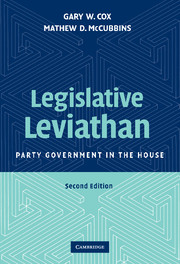Book contents
- Frontmatter
- Contents
- List of Figures
- List of Tables
- Acknowledgments
- Legislative Leviathan
- Introduction
- PART ONE THE AUTONOMY AND DISTINCTIVENESS OF COMMITTEES
- PART TWO A THEORY OF ORGANIZATION
- PART THREE PARTIES AS FLOOR-VOTING COALITIONS
- PART FOUR PARTIES AS PROCEDURAL COALITIONS
- PART FIVE PARTIES AS PROCEDURAL COALITIONS
- Conclusion
- Appendix 1 Uncompensated Seniority Violations, Eightieth through Hundredth Congresses
- Appendix 2 A Model of the Speaker's Scheduling Preferences
- Appendix 3 Unchallengeable and Challengeable Vetoes
- Appendix 4 The Scheduling Power
- Bibliography
- Author Index
- Subject Index
Appendix 3 - Unchallengeable and Challengeable Vetoes
Published online by Cambridge University Press: 05 June 2012
- Frontmatter
- Contents
- List of Figures
- List of Tables
- Acknowledgments
- Legislative Leviathan
- Introduction
- PART ONE THE AUTONOMY AND DISTINCTIVENESS OF COMMITTEES
- PART TWO A THEORY OF ORGANIZATION
- PART THREE PARTIES AS FLOOR-VOTING COALITIONS
- PART FOUR PARTIES AS PROCEDURAL COALITIONS
- PART FIVE PARTIES AS PROCEDURAL COALITIONS
- Conclusion
- Appendix 1 Uncompensated Seniority Violations, Eightieth through Hundredth Congresses
- Appendix 2 A Model of the Speaker's Scheduling Preferences
- Appendix 3 Unchallengeable and Challengeable Vetoes
- Appendix 4 The Scheduling Power
- Bibliography
- Author Index
- Subject Index
Summary
We consider a simplified version of the model of legislative politics outlined in Section 3 of Chapter 9. There are n ordinary members of the legislature, indexed by the integers from 1 to n, plus a Speaker, indexed by 0. Each member i has a Euclidean utility function ui defined over a one-dimensional policy space, with ideal point zi. The median floor member's ideal point is denoted by F.
Some subset of the ordinary members belong to a committee, the median ideal point of which is denoted C. This committee has the sole right to initiate bills.
If the committee decides to report a bill, it goes onto a calendar to await further processing. The Speaker, with ideal point z0 = S, has the right to remove bills from the calendar and schedule them for floor votes. If a bill makes it to the floor, it is considered under an open rule.
To say that the Speaker's veto is “unchallengeable” or “challengeable” in the current model can be construed as follows. Suppose that the Speaker's decision not to schedule a bill can be overridden at a collective cost of c. That is, if legislator i contributes ci to the overriding effort, and the sum of ci over all i exceeds c, then the bill can be scheduled over the Speaker's objections; otherwise not.
- Type
- Chapter
- Information
- Legislative LeviathanParty Government in the House, pp. 267 - 268Publisher: Cambridge University PressPrint publication year: 2007



